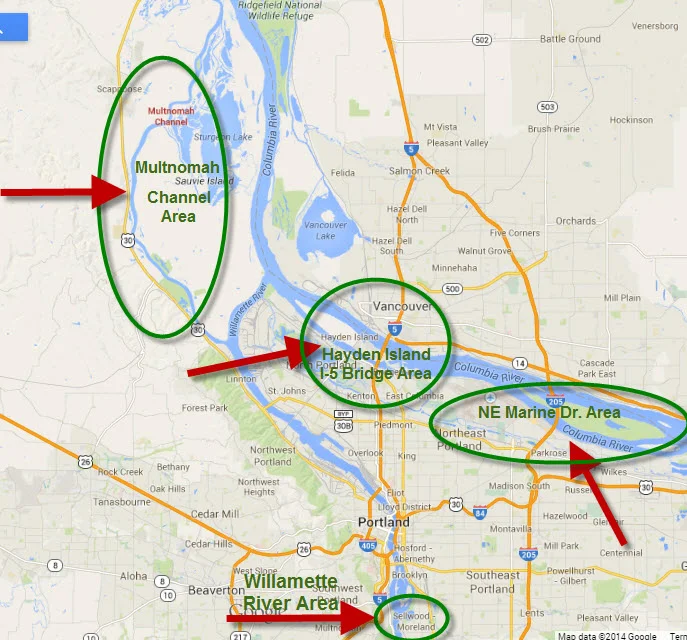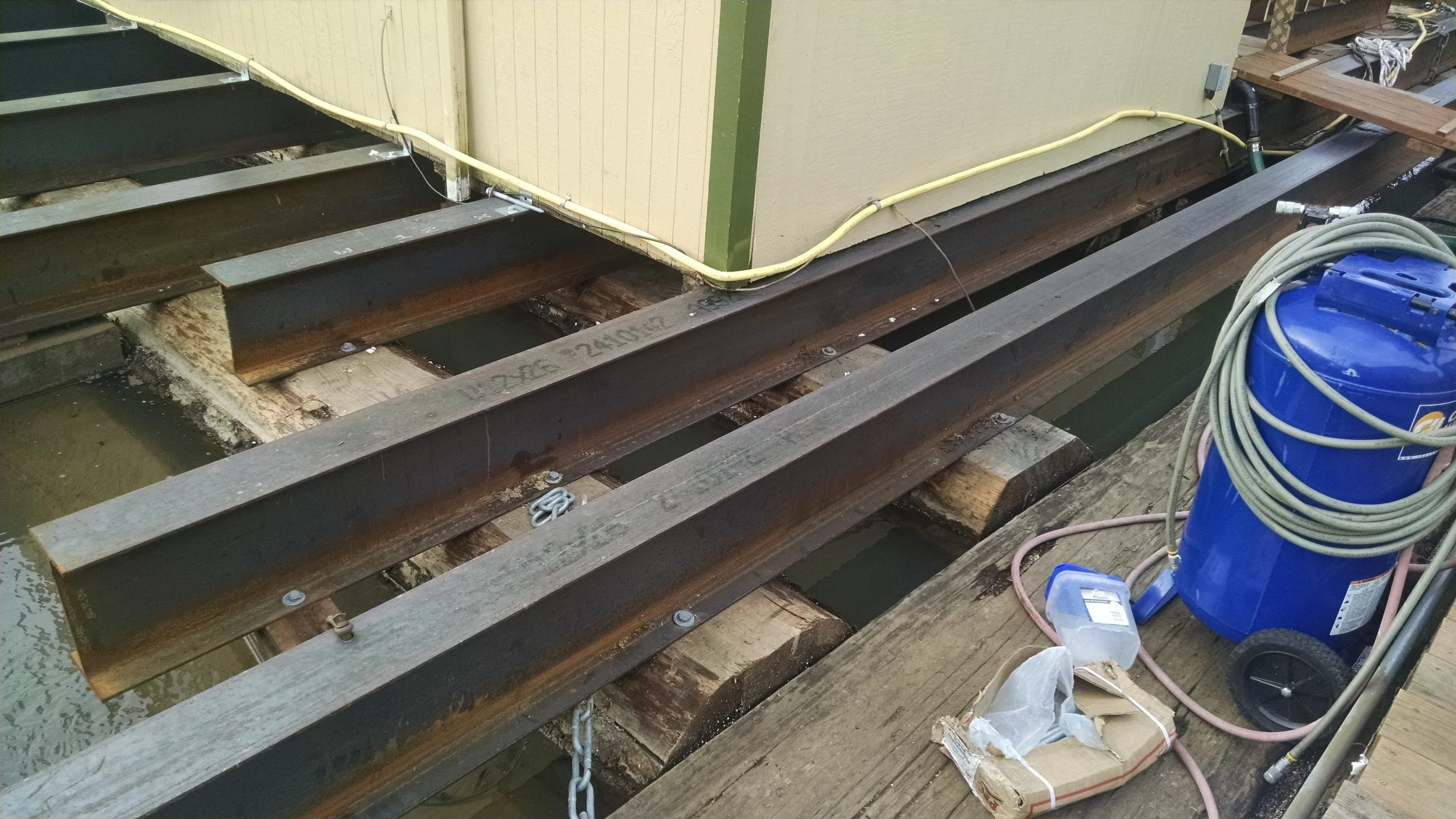The Willamette River vs. the Columbia River
One Floating Home Buyer's Journey
Every person's floating home aspirations and buying experiences are unique. Before making my floating home buying decision, I spent nine years, off and on, entertaining the idea of buying a floating home. I explored many different moorages on both the Columbia River and the Willamette River. (Check out our About pages to learn more about my floating home living experience.)
The river system in Portland, Oregon, is made up of the Willamette River, which runs generally in a Northerly direction, and is a tributary to the much larger Columbia River. The City of Portland is bisected by the Willamette River, with everything on the West side of the river assigned a westside address, and everything on the East side of the river assigned an eastside address. There are many beautiful bridges across the river linking the East side and the West side; hence the Portland moniker "Bridgetown."
The Columbia River runs in a Westerly direction through the majestic Columbia River Gorge until it reaches the Pacific Ocean in Astoria, Oregon. The Columbia River serves as the state line dividing Oregon State and Washington State, with Hayden Island tucked under the I-5 Bridge between the two states. (Hayden Island is officially in Oregon State, and therefore, offers sales tax free shopping opportunities.)
There are four major floating home moorage areas located along these two beautiful waterways.
There are several Columbia River moorages located along Northeast Marine Drive near the Portland Airport.
A second group of moorages are located on the Columbia River near Hayden Island and the I-5 Bridge.
A third group of moorages are located along the Multnomah Channel, which is a channel of water that connects to both the Columbia River and the Willamette River near Sauvie Island. These moorages can be reached by car via Oregon State Highway 30.
The fourth floating home moorage area is located on the Willamette River and includes only three floating home moorages. Due to a long standing moratorium, these three small moorages are the only floating home communities permitted on the Willamette River. The moorages are located between the Ross Island Bridge and the Sellwood Bridge, minutes from downtown Portland.
So, with all these beautiful moorages available, how did I ever manage to narrow my target market down to only these three Willamette River moorages?
I started my search thinking of buying a small weekender at an affordable price. My criteria was simply "floating," "livable," and "affordable." I looked at many floating homes on the Columbia River advertised for less than $25,000 to $35,000, which sounded great to me. Right away I noticed that the less expensive offerings were located in moorages that were constructed using "finger docks," wherein the main dockway runs parallel to the shoreline, with finger docks attached to the main dockway running out into the river channel perpendicular to the shoreline.
Islands Moorage Finger Dock Site Plan on the Columbia River at NE Marine Drive East of the PDX Airport
The floating homes are connected to either side of the finger docks, resulting in a layout that usually allows for only one home per finger dock with a truly unobstructed riverfront view. The rest of the homes on the finger dock face across to the next row of floating homes.
This caused me to think maybe I should pay more in order to enjoy the true riverfront view I had imagined having.
Dockside View of Combo Boat House with living Quarters -- Boat Garage Located on the Water Side
So I started looking in a higher price range at only floating homes located in riverfront view slips. This new criteria eliminated some nice moorages, but left many other beautiful moorages to consider. At this point, I also decided to eliminate the "combos," which are boat house, (like a floating garage for a boat) with very small living accommodations, either on a second floor or at the dockside of the structure. Although I owned a small runabout, I decided that I really wanted to invest in the living area, not the boat storage area. My thought was that maybe I could just tie my boat up to my floating home for the summer months and store it off-site in the winter.
The next important thing I noticed was airplane traffic overhead in some of the moorage areas I was looking in. The air traffic from Portland International Airport was significant in both the Northeast Marine Drive area and the Hayden Island/Jantzen Beach area. The "movie" I had in my head about what it would be like to spend time at my floating retreat did not include commercial air traffic noise at somewhat regular intervals, or the fine black exhaust soot that I noticed in some of these moorages. That's when I decided maybe I should look harder out on the Multnomah Channel, toward Sauvie's Island on Highway 30, at the moorages that were further removed from the airport.
There were many moorages in this area that offered nice riverfront slips, affordable home prices, and a quiet tranquil setting. Some of these moorages were so peaceful that it really felt like being out in the country. But something still wasn't quite right for me. Remember what I said earlier about each person's aspirations being different?
I made many trips back and forth to various Multnomah Channel moorages to clock the travel time at different times of the day. At non-peak traffic hours, it took me 25 to 30 minutes to get from Portland to Scappoose. This was not a "deal killer" for me. I know many people commute longer than that to drive from Portland to Salem every day for work. Still, it gave me pause. My motivation for buying a weekender was to create a refuge of sorts to get away and to relax and recharge. Setting myself up to have to drive 30 minutes into town and back every time a client needed something in town did not feel peaceful to me.
View from Floating Home Deck across Multnomah Channel
And there was something else. Something that was so subtle it took me awhile to put my finger on it. I had satisfied my criteria according to my checklist. I had even elimnated a couple of Multnomah Channel moorages that did not appeal to me in favor of one that really did. Then it dawned on me. The Multnomah Channel is a body of water that is off the main channel of the Columbia River. It is narrow, and by comparison to the Columbia or the Willamette, the current is slack. All but two of the moorages in this area face across the water toward Sauvie Island. From your floating home, you see a short span of water and a man-made berm built up on the other side of the channel. The subtle problem was that I didn't feel as happy and relaxed on this smaller body of water as I did on the Columbia River or the Willamette river!
View to NE from Macadam Bay Riverfront Deck
That's how my search criteria evolved. Over time I was able to determine that the Willamette River was the best choice for me.
- All three Willamette River moorages are located within minutes of downtown Portland.
- All three moorages offer slip ownership, as opposed to many other moorages where the buyer purchases the floating home but may only rent the slip from the moorage landlord.
- The Willamette River is known as the "banana belt" of the river systems because we don't experience the cold East winds that blow directly up the Columbia River Gorge.
- The air traffic overhead is minimal.
- The river is large enough to support any recreational activity you can think of, such as sailing, kayaking, power boating, rowing, jet skiing, stand up paddle touring, swimming, etc.
- I'm living in a community of only 37 floating homes, which is the approximate size of all three Willamette moorages. (Some Columbia River moorages have more floating homes than all three Willamette River moorages combined.)
- Most importantly, I feel good here in my Willamette River floating home!
If you are thinking of buying your first floating home, I encourage you to make your own checklist of the benefits that are most important to you and contact me if you want to know more about owning a floating home on the Willamette River!



















Portland’s home values are the fastest-growing in the country.